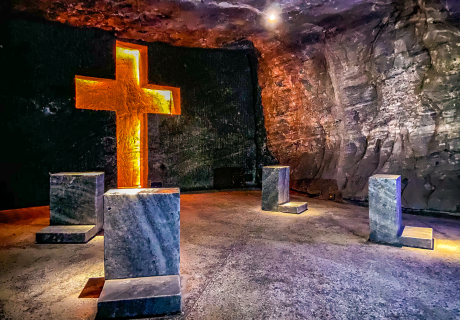I regularly hear words of alarm and outrage from some of Jesus’ followers who embrace a gloomy view of the world. Confession: I used to hold that viewpoint, too. It’s all tied into a futurist understanding of Revelation and Bible prophecy, which teaches that things will worsen until Jesus returns. I used to look for evidence that everything was deteriorating, but I eventually woke up because history and the present world tell a different story. For the most part, the world is a better place to live now than ever in human history.
And so, when I hear people say, “Every year, it gets worse and worse,” I find myself reacting to this so-called “Christian” form of outrage. Some of Jesus’ followers feel compelled to be incensed about something as fuel to keep their faith alive. I don’t believe this is an appropriate way for God’s people to live.
Amazing Insight
Consider what it would be like to build a church in a corrupt and dreadful place next to a temple that was dedicated to an idolatrous god that was worshipped by people having sex with prostitutes and animals. That story is reflected in Jesus’ incredible discussion with his disciples in Caesarea Philippi, near a mountainous region containing Mount Hermon, Israel’s largest mountain.
Matthew tells us that Jesus asked his disciples what people were saying about him. They told Jesus that people’s opinions were mixed, with some believing Jesus was John the Baptist reincarnated. Others thought Jesus was Elijah, Jeremiah or one of the prophets who had returned from the dead.
Jesus then asked his disciples for their thoughts on his identity. Peter answered first, of course, “You are the Messiah, the Son of the living God.”
Play on Words
Jesus told Peter that his insights had a heavenly origin, “And I tell you that you are Peter, and on this rock, I will build my church, and the gates of Hades will not overcome it.”
The Play on words in the original manuscript was between Peter (Petros), a rock that can be thrown, and Rock (Petra), a large mass rising from the earth. Matthew 16:18 could be translated as, “I tell you, Peter, that you are like a little stone, but on this massive mountain of the revelation of who I am, I will build my church.” The Church was and is established on the foundation of Jesus the Messiah.
The Worst Place
So, what are the gates of Hades that will not overcome Jesus’ Church? As mentioned, this conversation occurred at Caesarea Philippi, ancient Paneas, “The city of Pan.” In Jesus’ day, a temple to the goat god Pan was at the centre of town.
Pan received worship through intimate acts with goats. The court in public view outside the temple was called the Court of Pan and the Nymphs. Nymphs are creatures of fantasy, like elves or fairies and were thought to be a large group of inferior divinities. Today, the word can refer to a woman who suffers from hypersexuality, a mental illness.
Pan’s temple was set on the side of a gigantic rock face. Next to it was an enormous cave where the Jordan River originates and flows to the Dead Sea. The cave was called the “gates of Hell.” The priests of Pan would say that if you did not worship Pan to his satisfaction, he would open the cave and swallow you into Hell.
For the disciples, this was an evil place, and this is where Jesus says, on this rock, I will build my Church, and the gates of Hades will not overcome it. In other words, think of the most formidable and least likely place to found a church; that is where the Church will thrive.
Worth Considering
I find it fascinating that of all the places where Jesus could initiate his Church, he chose that place. It’s a truth that resonates through the centuries right down to our time.
The Church has had the worst of things thrown at it. It’s been outlawed and oppressed, and its people persecuted and martyred. Sacred books and Bibles were burned or banned. Add to that the trouble we’ve brought on ourselves – immoral and abusive pastors and priests, Church splits, discrimination against minorities and selfishness, always wanting everything our way. It’s a miracle that the Church still exists, but here we are.
My encouragement to you is simple: while some awful things are happening in the world right now, the world is much better than it was. If you follow Jesus, Set your mind on things above, not earthly things. Jesus affirmed that His Church would be built on the rock where the darkest rituals occurred, and it would prevail. Live in faith, not fear and be encouraged.










